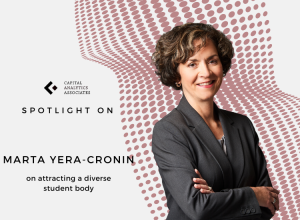 4 min read February 2024 — Invest: interviewed Marta Yera Cronin, president of Delaware County Community College, who emphasized the importance of addressing underserved populations and zip codes and the increasing importance of promoting trades at community colleges. “Our goal is to attract more students and encourage them to start their college journey earlier,” she said.
4 min read February 2024 — Invest: interviewed Marta Yera Cronin, president of Delaware County Community College, who emphasized the importance of addressing underserved populations and zip codes and the increasing importance of promoting trades at community colleges. “Our goal is to attract more students and encourage them to start their college journey earlier,” she said.
What is your vision for Delaware County Community College, and how are you working to realize that vision?
As a relatively new member of the team, my primary focus is on expanding our reach and promoting our college in underserved areas. Many people in Chester County are unaware that we serve Chester County, so we’re working to increase our visibility in those zip codes and connect with more high schools. Our goal is to attract more students and encourage them to start their college journey earlier. We also want to prioritize trade programs and emphasize that college isn’t just about academics. We offer a variety of hands-on programs and resources to help students succeed, no matter their background or goals. If you’re interested in pursuing a college education, we’re here to support you every step of the way. We have the resources and expertise to help you achieve your goals, as long as you’re willing to put in the effort.
How are you adding variety to your programs to capture more students?
Recently, we arranged a meeting with 17 trade unions and other industry partners, and almost 40 people showed up. They were all men, but we would love to see more women in trades. In most regions across the country, there aren’t enough skilled trade workers. These are high paying jobs, so we really want to promote them.
What have been some recent highlights or milestones for the college?
We broke ground on a new campus in Upper Darby right before I started as president. We have two smaller campuses out that way, but they aren’t in the ideal location. The new center is more centrally located and would allow us to bring those campuses together. In addition to our program offerings, we are actively involved in the hospitality sector, recognizing its popularity and growth potential. Collaborating with the YMCA, we will operate an early childhood teacher center, providing daycare and after-school programming for students attending classes. Our aim is to be part of the solution and to engage students in potential career paths. To address the teacher shortage, we have secured funding to train more teachers. This free program is available to high school students, allowing them to get started on their teaching careers early. Lastly, we have launched a bio-medical technology program with around two dozen students enrolled in our pilot program. Our focus is to swiftly identify industry needs and align our programs accordingly.
What skills or programs are seeing greater demand and how are you catering to that demand?
We have a few areas of high priority, including healthcare, education, skilled trades, IT and advanced manufacturing. We have created programs in each of these areas and collaborate with our partners to enhance them. We are very nimble so we can make things happen quickly. It is important that we address the skills needed for the workplace of tomorrow. As part of accreditation, we have an advisory committee for every new program. This is especially needed with industries that focus on technology. We recently incorporated cloud computing and AI into our curriculum, but we cannot afford to wait a year to assess and identify emerging needs. We need to respond rapidly to do our jobs, so we will continue to have those conversations to anticipate future jobs and the associated skills. It is our job to keep the finger on the pulse of what is happening.
How are you solving problems with diversity, equity, and inclusion at the college?
We are trying to attract a diverse student body, but also, we are trying to reflect that in our recruitment of staff and faculty. We hired a vice president of DEI to engage and mentor with students, so that helps a lot. A lot of our enrollment comes from word of mouth. We have a Center for Equity and Social Justice, where people can be exposed to diverse points of view. That will be ongoing because our population will continue to shift. Industry wants more diversity, so it is a bit competitive.
What are some challenges for the college, and how are you dealing with them?
Many believe there will be another enrollment cliff in 2025, and we will see a reduced population. However, our population is not the traditional just-out-of-high-school student body, so that can be an advantage. We actively motivate students to explore alternative programs and credentials that can assist them in their academic journey. We provide comprehensive wrap-around services, including food, transportation, and complimentary textbooks. All we require from our students is their commitment and dedication. You just bring your brain and work ethic, and we can help with the rest.
What is your outlook for the college and the education sector for the next two to three years?
In the workforce space, employment will be secure for the foreseeable future, with a continued demand for professionals in healthcare and technology. We must continue prioritizing the workforce. There will be a shift in higher education towards practical, immediately applicable skills, rather than a broad-based approach. By familiarizing students with potential career paths earlier, they can better identify their talents and interests upon entering college, potentially saving time and resources. Education needs to change, and we are addressing that to move forward.
For more information, please visit:
